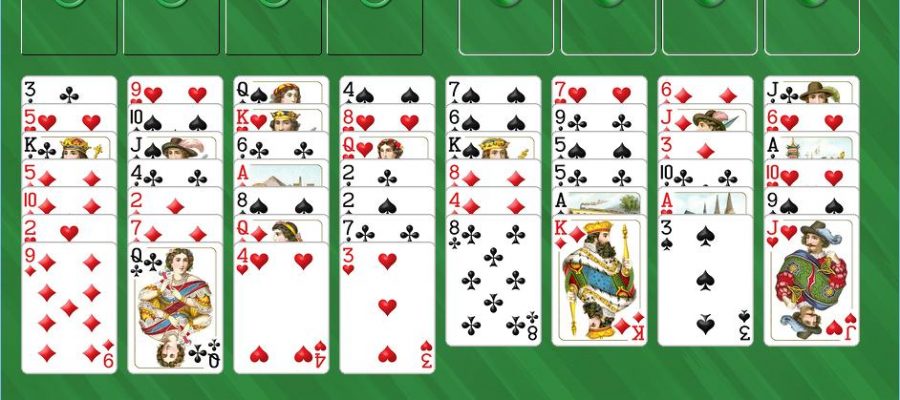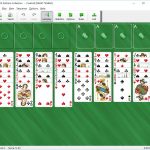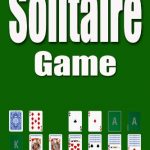Content Table:
Freecell Solitaire Strategy Guide
Freecell Solitaire is a highly popular game, made famous by Microsoft. Included in Windows, it is considered a classic solitaire game by many. Because you can see all the cards right from the start, there is no luck involved, making Freecell one of the few solitaire games that is based entirely on the player’s skill.
Freecell is quite a hard game, but despite that, all deals (except for deal number 11982) are solvable in the 32,000 deals in Microsoft’s version.
Using Freecells Wisely
The key to finishing Freecell is the judicious use of the freecells. They should be used as temporary storage, only holding cards for a short time to help you move longer sequences around.
For example, suppose you had a column with the following cards (taken from deal 14396):
5 Hearts
Ace Spades
Ace Hearts
4 Clubs
In this situation, it is okay to move the 4 of Clubs to a freecell because we know that we can then move the two Aces to the foundation and subsequently move the 4 of Clubs back from the freecell onto the 5 of Hearts. See how the freecell was only used temporarily?
Safe Moves
There are certain moves you can make at any time in Freecell and know they won’t ‘trap’ you later on in the game. You can move the Aces (and the twos when they can be played) at any time, as no other cards depend on them. For other cards, you can safely move them to the foundation if the cards one rank lower, of the opposite color, are already in the foundation. For example, you can safely move the 5 of Diamonds if the black 4s have already been moved to the foundation.
Better Freecell games will automatically perform these safe moves for you, allowing you to concentrate on the moves that matter, rather than having to manually make inconsequential moves.
The Need to Empty Columns
Your first goal in Freecell is to empty a column. Why is this important? Because an empty column allows you to move longer sequences around. The size of the sequence you can move in Freecell is based on the number of available freecells and empty columns. The more empty freecells and columns you have, the longer the sequence you can move.
The formula for how many cards you can move is:
(number of empty freecells + 1) * 2 ^ (number of empty columns)
For the less mathematically inclined, here is a table showing how many cards you can move in different scenarios:
| A | B | C |
|---|---|---|
| 0 | 0 | 1 |
| 0 | 1 | 2 |
| 0 | 2 | 3 |
| 0 | 3 | 4 |
| 0 | 4 | 5 |
| 1 | 0 | 2 |
| 1 | 1 | 4 |
| 1 | 2 | 6 |
| 1 | 3 | 8 |
| 1 | 4 | 10 |
| 2 | 0 | 4 |
| 2 | 1 | 8 |
| 2 | 2 | 12 |
| 2 | 3 | 16 |
| 2 | 4 | 20 |
As you can see, empty columns are particularly valuable, as they allow you to move considerably longer sequences. By the time you have two columns free (particularly with two or more freecells free), you can move very long sequences, and the game is usually quite easy to complete from there.
How to Empty Columns
So what is the easiest way to empty a column? Start by emptying columns that don’t have any Kings in them. A column with a king can’t be emptied initially, as there is nowhere for the King to go.
Don’t just make moves because you can. Have a mini plan in mind and only move cards if they help empty the column you are aiming for. Another popular strategy is to go straight for releasing the Aces, and then the 2’s, etc. This strategy is easier and requires less thought. It will work for the easier games but won’t help on the hard deals.
The most important strategy of all is to try and keep the freecells empty. If you can do that and empty a couple of columns as well, then you should find it very easy to finish the game.



